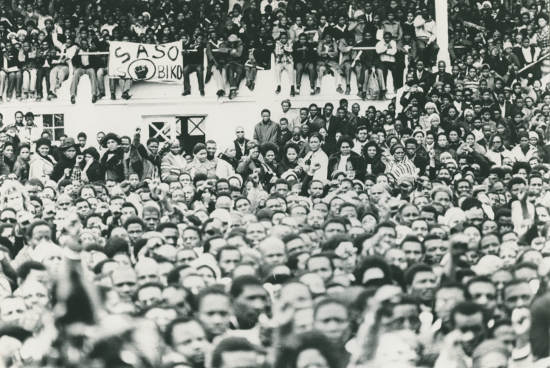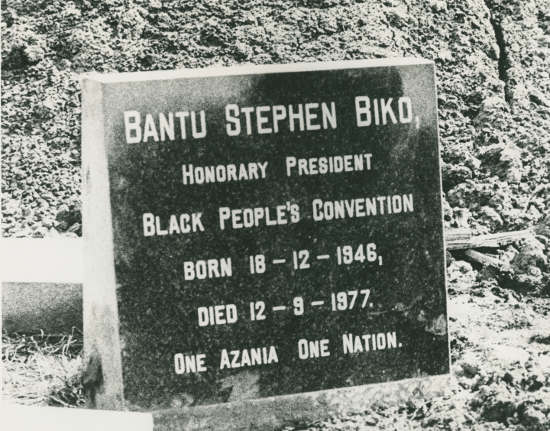
Stephen Biko, political activist and ideological leader of the Black Consciousness Movement (BCM), was only thirty years old when he died in detention under mysterious circumstances on 12 September, 1977. His political career was brief, but had a profound impact on the liberation struggle. He espoused the philosophy of black consciousness, linking identity politics and social action.
Biko first became involved in liberation politics through the National Union of South African Students (NUSAS) while attending medical school. His views on black identity and pride led to the formation and expansion of the South African Students' Organisation (SASO) in the late 1960s. Biko served as both the president and publicity secretary for this body, which served as the nucleus of the BCM. He founded the Black People's Convention (BPC) and was banned by the South African State in 1973. This new movement empowered a generation of young black South Africans, fuelling revolutionary events, including the 16 June 1976 Soweto Uprising.
 Biko's prolific writings, political lobbying, and his community activism drew the attention of the Security Police, and he was detained on numerous occasions. His life was adversely affected in many ways, including expulsion from the University of Natal in 1972, his first banning in 1973, and, ultimately, his death in detention on 12 September, 1977. He is regarded as a martyr of the liberation struggle. His 18 August 1977 detainment included severe torture at the hands of security police. He was interrogated for twenty two hours, and beaten until he suffered brain damage. He was chained to a window grille and denied medical attention for his injuries. His injuries did not improve, but it was only on 11 September that he was taken to Pretoria for medical attention, but he died shortly after his arrival.
Biko's prolific writings, political lobbying, and his community activism drew the attention of the Security Police, and he was detained on numerous occasions. His life was adversely affected in many ways, including expulsion from the University of Natal in 1972, his first banning in 1973, and, ultimately, his death in detention on 12 September, 1977. He is regarded as a martyr of the liberation struggle. His 18 August 1977 detainment included severe torture at the hands of security police. He was interrogated for twenty two hours, and beaten until he suffered brain damage. He was chained to a window grille and denied medical attention for his injuries. His injuries did not improve, but it was only on 11 September that he was taken to Pretoria for medical attention, but he died shortly after his arrival.
J.T. Kruger, then-Minister of Justice, denied that police had abused their internationally renowned detainee, arguing that his death was the result of hunger strike. An autopsy conducted by the late pathologist Jonathan Gluckman at the request of Biko's family found that he had died of brain damage as a result of blows inflicted upon him during his detention. Gluckman's report led to an inquest: no policemen were charged, but Biko's family eventually received a settlement from the state.  The cover-up of Biko's death in detention was exposed by then-journalist Helen Zille in the Rand Daily Mail, edited by Allister Sparks. Zille had received evidence from Biko's doctors, including Gluckman. Biko's death sent shockwaves around the world, and his funeral, attended by ten thousand, resulted in nationwide incidents of social unrest. During the Truth and Reconciliation Commission (TRC) proceedings, four of the surviving policemen involved in Biko's death were refused amnesty.
The cover-up of Biko's death in detention was exposed by then-journalist Helen Zille in the Rand Daily Mail, edited by Allister Sparks. Zille had received evidence from Biko's doctors, including Gluckman. Biko's death sent shockwaves around the world, and his funeral, attended by ten thousand, resulted in nationwide incidents of social unrest. During the Truth and Reconciliation Commission (TRC) proceedings, four of the surviving policemen involved in Biko's death were refused amnesty.
Read the TRC press release on the amnesty decision on Biko's death.
Steve Biko and the Freedom of Information Programme
SAHA is assisting the Steve Biko Foundation to attain copies of the Security Legislation Directorate files that the apartheid regime compiled on numerous Black Consciousness Movement (BCM) members. In October 2008, SAHA submitted PAIA requests for the files in question. To date the National Archives have made all of the requested files available, though collection for some is still outstanding. SAHA has delivered all but 3 to the Foundation. The Steve Biko Foundation is using the information in the files to create biographic profiles that will appear in the Steve Biko Museum in King Williams Town, when the museum is opened.
For more details about the Steve Biko Museum contact the Steve Biko Foundation.
The Freedom of Information Programme (FOIP) was launched in 2001 with the aim of creating awareness of, compliance with and use of PAIA by submitting requests for access to information. Since its inception, the programme has built up a comprehensive collection of released materials (archived within SAHA as collection AL2878).
Contact the Freedom of Information Programme (FOIP)
Related SAHA Collections
AL2878 :: The Freedom of Information Programme (FOIP) Collection
The Freedom of Information Programme (FOIP) collection comprises copies of materials released pursuant to the Promotion of Access to Information Act (PAIA). The collection includes apartheid era security establishment records, documents created by the South African government bodies and agencies post- apartheid, and documents from several private bodies. It also contains documentation of the collection process. Special Projects, undertaken by the South African History Archive (SAHA) to test the parameters of freedom of information in South Africa, include materials relating to the Truth and Reconciliation Commission (TRC) in particular sensitive materials; g ays in the apartheid military; South African Defence Force (SADF), the apartheid government's nuclear weapon programme; HIV/AIDS policies and implementation thereof of private bodies and parastatals; the health and environmental impacts of the nuclear energy industry, and documents relating to migration to and within RSA.
ays in the apartheid military; South African Defence Force (SADF), the apartheid government's nuclear weapon programme; HIV/AIDS policies and implementation thereof of private bodies and parastatals; the health and environmental impacts of the nuclear energy industry, and documents relating to migration to and within RSA.
AL3129 :: The Zapiro TRC Cartoon Collection
This collection comprises of political cartoons that Zapiro (Jonathan Shapiro) produced when the Truth and Reconciliation Commission (TRC) was established. It was published on a weekly basis for the “Mail and Guardian” and on a daily basis for the “Sowetan” and the “Cape Argus”. Zapiro lampoons in many cartoons the way "justice" was meted out during the course of the TRC as well as fundamental inadequacies he finds in its task of "truth-finding".
Knowing that nobody dies until they're forgotten
We chant Biko today
Biko tomorrow
Biko forever."
- 'Biko the Greatness', Benjamin Zephariah






 Biko's prolific writings, political lobbying, and his community activism drew the attention of the Security Police, and he was detained on numerous occasions. His life was adversely affected in many ways, including expulsion from the University of Natal in 1972, his first banning in 1973, and, ultimately, his death in detention on 12 September, 1977. He is regarded as a martyr of the liberation struggle. His 18 August 1977 detainment included severe torture at the hands of security police. He was interrogated for twenty two hours, and beaten until he suffered brain damage. He was chained to a window grille and denied medical attention for his injuries. His injuries did not improve, but it was only on 11 September that he was taken to Pretoria for medical attention, but he died shortly after his arrival.
Biko's prolific writings, political lobbying, and his community activism drew the attention of the Security Police, and he was detained on numerous occasions. His life was adversely affected in many ways, including expulsion from the University of Natal in 1972, his first banning in 1973, and, ultimately, his death in detention on 12 September, 1977. He is regarded as a martyr of the liberation struggle. His 18 August 1977 detainment included severe torture at the hands of security police. He was interrogated for twenty two hours, and beaten until he suffered brain damage. He was chained to a window grille and denied medical attention for his injuries. His injuries did not improve, but it was only on 11 September that he was taken to Pretoria for medical attention, but he died shortly after his arrival. The cover-up of Biko's death in detention was exposed by then-journalist Helen Zille in the Rand Daily Mail, edited by Allister Sparks. Zille had received evidence from Biko's doctors, including Gluckman. Biko's death sent shockwaves around the world, and his funeral, attended by ten thousand, resulted in nationwide incidents of social unrest. During the Truth and Reconciliation Commission (TRC) proceedings, four of the surviving policemen involved in Biko's death were refused amnesty.
The cover-up of Biko's death in detention was exposed by then-journalist Helen Zille in the Rand Daily Mail, edited by Allister Sparks. Zille had received evidence from Biko's doctors, including Gluckman. Biko's death sent shockwaves around the world, and his funeral, attended by ten thousand, resulted in nationwide incidents of social unrest. During the Truth and Reconciliation Commission (TRC) proceedings, four of the surviving policemen involved in Biko's death were refused amnesty.